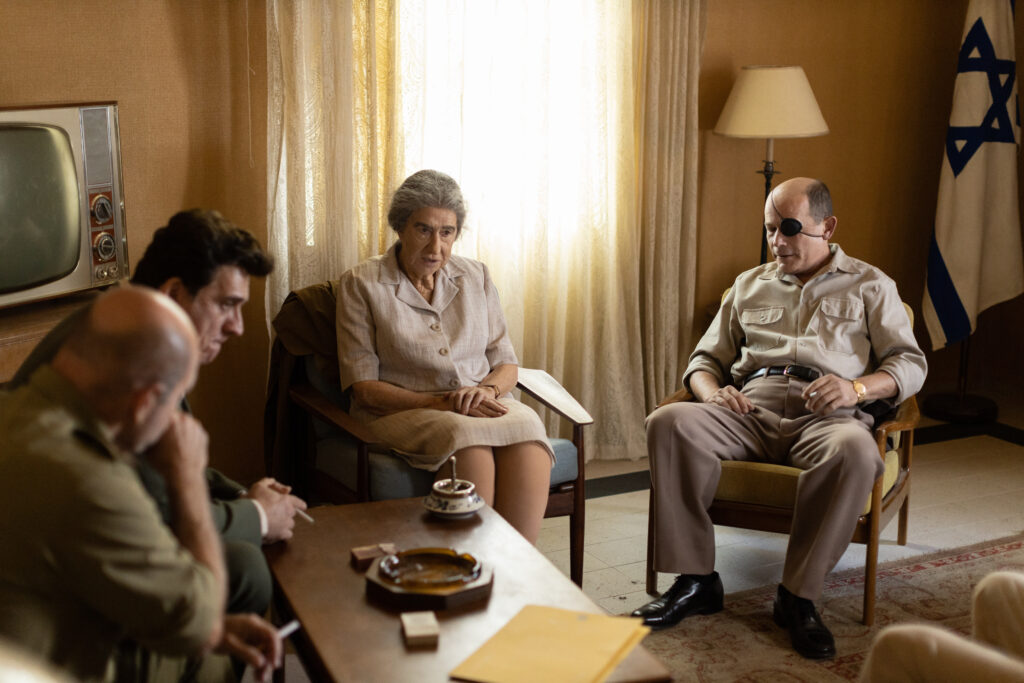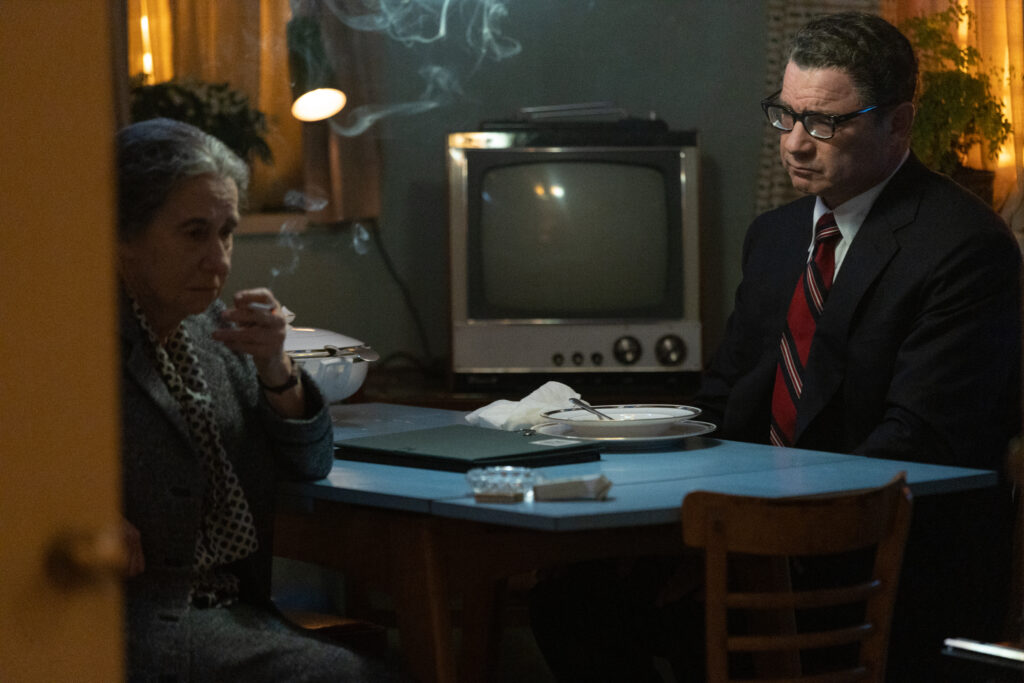Camille Cottin, drama, Dvir Benedek, Golda, Guy Nattiv, Helen Mirren, Liev Schreiber, Lior Ashkenazi, movies, Rami Heuberger, reviews
November 18, 2023
by Carla Hay

Directed by Guy Nattiv
Some language in Hebrew with subtitles
Culture Representation: Taking place in Israel, mostly in 1973, the dramatic film “Golda” (based on true events) features an all-white cast of characters representing the working-class, middle-class and wealthy.
Culture Clash: Israel prime minister Golda Meir deals with crises inside and outside her cabinet of quarreling subordinates during the 19-day Yom Kippur War while she secretly battles cancer (lymphoma).
Culture Audience: “Golda” will appeal primarily to people who are fans of star Helen Mirren and history-based war dramas that play it too safe.

“Golda” undercuts its intentions of being a gripping drama of Israeli leader Golda Meir during the Yom Kippur War, by showing her as a mostly aloof politician making decisions in safe office rooms. Helen Mirren is not completely convincing as Meir. The movie did not have to be filmed like a documentary, but too much of this film has hokey and very fake-sunding dialogue and does very surface-level depictions of the horrors of this war.
Directed by Guy Nattiv and written by Nicholas Martin, “Golda” is mostly a series of tense meetings that Golda Meir (who was prime minister of Israel from 1969 to 1974) has with her all-male cabinet of subordinates and other politicians and bureaucrats during the 19-day Yom Kippur War in 1973. Through it all, she chain smokes, has occasional nightmares at home, and confides in her best friend/personal assistant Lou Kaddar (played by Camille Cottin), who was one of the few people who knew that Golda had cancerous lymphoma. (For the purposes of this review, the real Golda Meir will be referred to as Meir, while the Golda Meir character in the movie will be referred to as Golda.)
The movie begins in 1974, when Golda is being interviewed by a panel of five men during the Agranat National Commission of Inquiry in Jerusalem. She has to answer for her controversial decisions and actions during the Yom Kippur War, which started on October 6, 1973. Her attitude during this interrogation is defiant and defensive.
The war was also known as the October War, the Ramadan War, the 1973 Arab–Israeli War, and the Fourth Arab–Israeli War. Arab states (led by Egypt and Syria) tried to seize Israeli-occupied locations, with most of the fighting taking place at the Sinai Peninsula and the Golan Heights. In the end, Israeli was victorious, but it cost Meir her political career.
During the movie’s scene of Golda appearing before the Agranat National Commission of Inquiry panel, she explains her perspective of what happened during the Yom Kippur War. The rest of the movie is a flashback to that period of time in 1973. One of the problems with the way the story is told is that it gets distracted with a subplot about Israeli and Egyptian spies. A better movie would have stayed entirely focused on Golda’s perspective.
But even showing things from Golda’s perspective has some issues in this movie. She’s seen in places like boardrooms and control rooms, where she hears reports about the war and listens to conflicting advice about military strategy, but she doesn’t seem very interested in fully understanding the human costs of the war. It isn’t until one of her secretaries experiences a personal loss from the war that it starts to sink in with Golda that she’s been shielding herself from these realities of war for too long.
“Golda” will no doubt get some criticism for being a war movie that doesn’t show any combat scenes. On the one hand, it might be the filmmakers’ way of making a statement that prime ministers and other national leaders are far removed from the being in the trenches (so to speak) during war. On the other hand, it comes across as tone-deaf that the movie couldn’t even attempt to show more of what people on the frontlines of the war experienced. It’s also hard to believe the movie’s depiction of Golda being as sheltered as she is from witnessing the deadly consequences from her decisions.
Much of “Golda” is about her trying to navigate another war: the feuding between members of her cabinet. There were disagreements on military decisions, there were power struggles, and there were internal betrayals. The cabinet members who were at odds with each other included head of military intelligence Eli Zeira (played by Dvir Benedek), minister of defense Moshe Dayan (played by Rami Heuberger), and chief of staff David “Dado” Elazar (played by Lior Ashkenazi). All of the supporting cast members in the movie give capable but not outstanding performances.
“Golda” also has some underwhelming scenes of her interactions with Henry Kissinger (played by Liev Schreiber), who was a newly appointed secretary of state for the United States at the time. Henry was reluctant for the U.S. to get involved in the Yom Kippur War, while Golda was pressuring him to have the U.S. take a stand. Unfortunately, the way that “Golda” depicts her telling him about the war is with this trite comment when she talks to Henry on the phone: “We’ve got trouble with the neighbors again.”
Mirren certainly seems to be putting in a sincere effort to depict Meir with authenticity. However, the end result is that Mirren (who is British in real life) never quite embodies the Golda character in an entirely believable way and lets the makeup and costumes do a lot of the acting. Much of the dialogue also sounds very phony and overly simplistic.
Perhaps the biggest disappointment about “Golda” is that by the end of the movie, viewers will feel like they will know about her military decisions during this war but haven’t learned much about Golda as a person. The tone of the film is a repeat loop of “and this happened, and then Golda did this, and then this happened.” This formula quickly becomes very monotonous.
There’s a scene in the movie when Golda tells Lou to let her know if she ever sees Golda showing the slightest sign of dementia. “You will tell me,” Golda says. “I can’t trust the flatterers.” The same can be said of anyone who over-praises this mediocre movie as anything but what it is: a very surface-level and often dull film where Mirren’s talent is squandered in doing a Golda Meir impersonation, not a Golda Meir revelation.
Bleecker Street released “Golda” in U.S. cinemas on August 25, 2023. The movie was released on digital and VOD on September 19, 2023. “Golda” was released on Blu-ray and DVD on October 17, 2023.
